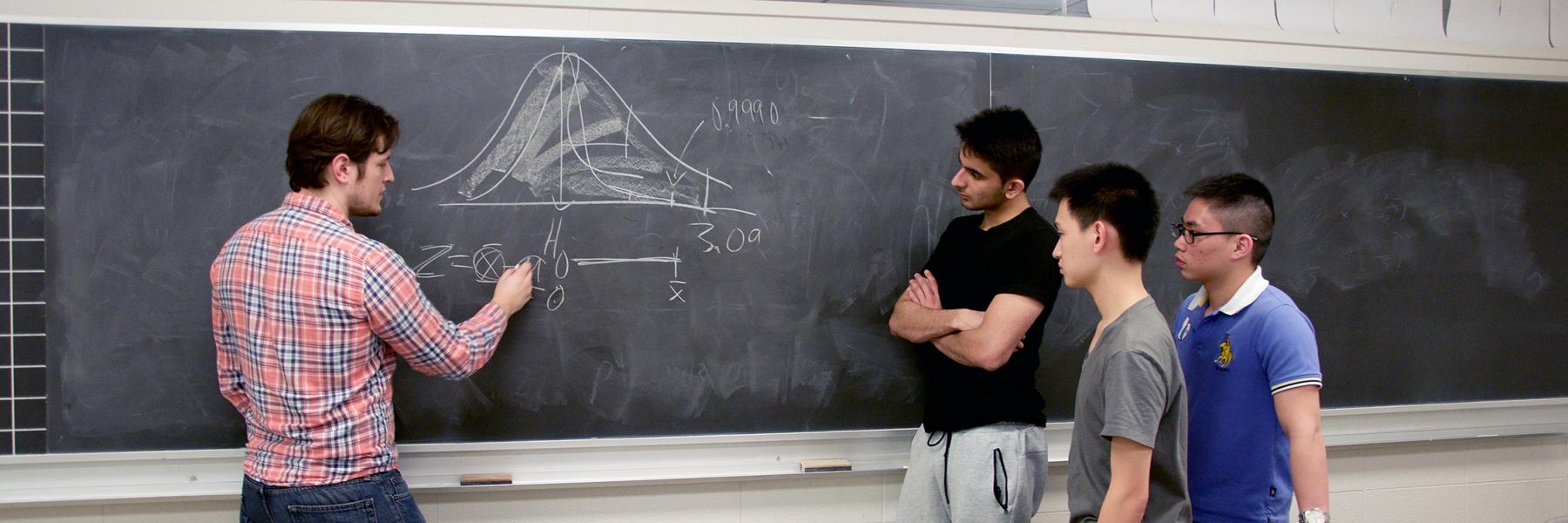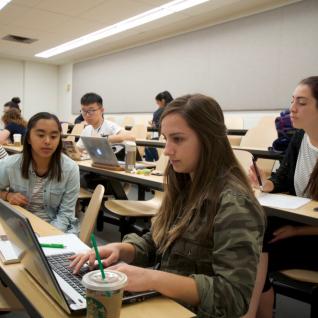Applied Statistics Minor (HBSc)
Admissions Category: Statistics

Program Overview
This program provides an opportunity to learn concepts and application of statistical methods, for students with a conceptual statistics foundation such as STAB22. The program is intended for students whose major program of study is in a non-mathematical field, but who wish to learn some statistics to support them in their study. Statistics is the study of the collection, organization, analysis, interpretation and presentation of data. The Applied Statistics program is all about experiential learning and is an excellent choice for students with strong quantitative skills and the desire to solve practical problems.
Complementary Programs:
Statistics, Mathematics, Computer Science and many subject areas that require some quantitative analysis.
Check out future career opportunities and skills acquired from completing this program:
Competencies & Skills
- Appropriate handling of quantitative data
- Statistical software (eg., R)
- Writing statistical reports
- An appreciation of appropriate statistical methods to use
Careers for Graduates
- Quantitative work in their major field of study, for example, environmental science, quantitative psychology, epidemiology
Further Education
- Graduate work in the student’s major field of study that has a quantitative component, eg., environmental science, psychology, epidemiology
- Statistics
- Actuarial Science
- Epidemiology
- Accounting or Taxes
- Bioinformatics
- Business Administration
Program Pathway
Year 1 | Year 2 | Year 3 | Year 4Choose Your Courses Wisely
-
Explore different kinds of courses; this will also help with fulfilling breadth requirements and electives.
-
Use Degree Explorer to plan your courses and program of interest.
Develop Your Academic & Research Skills
-
Attend CTL’s Math & Statistics Learning Centre for tutoring services
-
Schedule an appointment with your Program Librarian for in-depth research assistance with your assignments.
- Get writing support at CTL’s Writing Centre.
Apply Theory to Practice
-
Attend the UTSC Faculty Mix & Mingle Fair to connect with professors and learn more about their specialties.
-
Start building your Co-Curricular Record (CCR) and search for Experiential Learning and Work-Integrated Learning opportunities.
Become an Engaged Citizen (Locally & Globally)
-
Get involved with the Association of Mathematics and Computer Science Students (AMACSS); also explore other relevant student clubs and activities on campus.
-
Explore DSL programs that will build your leadership skills by getting involved in the community.
Plan for Your Future Career
-
Volunteer with organizations to explore your interests; check listings on CLNx (
-
Attend the Get Experience Fair in September and register with SCSU’s Volunteer Network Program to explore opportunities.
Year 2
Choose Your Courses Wisely
- 0.5 credit from the following: STAB22H3, STAB23H3, MGEB11H3, PSYB07H3, STA220H1.
- 0.5 credit from the following: STAB27H3, MGEB12H3, PSYC08H3, STA221H1.
- Use Degree Explorer to plan your courses and program.
- Meet with your Program Advisor to ensure you are on track with your degree.
Develop Your Academic & Research Skills
-
Further develop your general academic skills by attending workshops offered by the Academic Advising & Career Centre (AA&CC) and Centre for Teaching & Learning (CTL).
Apply Theory to Practice
-
Get involved in relevant opportunities on and/or off campus; apply to Work Study, or other part-time and summer jobs on CLNx (
Become an Engaged Citizen (Locally & Globally)
-
Check CLNx (
Plan for Your Future Career
- Considering grad school? Speak to professors and advisors early so you are on track.
-
Explore careers through the AA&CC’s Job Shadowing and In The Field programs.
Year 3
Choose Your Courses Wisely
- 1.5 credits as follows: STAC32H3, STAC53H3, STAD29H3.
-
Use Degree Explorer to ensure you are on track with your degree.
Develop Your Academic & Research Skills
- Consider competing for the UTSC Library Undergraduate Research Prize or Poster Forum.
- Check the department website for summer research and scholarship opportunities.
Apply Theory to Practice
- Build on your skills and knowledge through relevant events offered through your department, student groups, DSL and the AA&CC.
Become an Engaged Citizen (Locally & Globally)
- Run for an elected position in AMACSS or another student group or club.
- Look into volunteering or working overseas to expand your network through International Student Centre’s (ISC) Global Learning programs.
Plan for Your Future Career
- Plan a career path with a staff member at the AA&CC.
- Check CLNx for networking events and employer information sessions to attend.
- Attend the Graduate & Professional School Fair in September.
Year 4
Choose Your Courses Wisely
-
Register your “Intent to Graduate” on ACORN by the deadline.
Develop Your Academic & Research Skills
-
Apply for an Academic Travel Fund through Department of Student Life (DSL) to research, present at a conference, or engage with the international academic community.
Apply Theory to Practice
-
Attend the Summer & Full-time Job Fair in January to meet with potential employers looking to hire students for summer and full-time positions relevant to your field.
Become an Engaged Citizen (Locally & Globally)
-
Participate in the AA&CC’s Partners in Leadership program to learn and network with an alumni mentor about transitioning to work or further education.
Plan for Your Future Career
-
Attend the AA&CC’s Get Hired job search conference in April/May.
-
Attend a Jobs for Grads orientation for a job search “crash course” and for access to full-time job listings.
-
Get your personal statement reviewed in the AA&CC.
